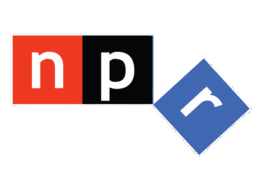
He’s going to be embarrassed by today’s ”TBT” blog post, but that’s OK. Don Anthony deserves the accolades. Today’s trip back seven years down Memory Lane celebrates Morning Show Boot Camp’s 30th anniversary. But it also celebrates air talent in our history—a group that doesn’t always earn the respect they deserve.
How many fewer on-air jobs are there in today’s radio industry than when I originally wrote this post in 2018? We don’t know, of course, but if someone was somehow keeping a census, the not-so-grand total would likely be terrifying. Who would have thought personalities and presenters would end up on the “endangered radio careers list?” But that’s how far our industry has devolved since then.
And yet, Don’s conference endures—while the others are either gone or experiencing shrinkage. And Don’s attendees are as excited to be at his conference and on the air as ever. What does that say about his vision and what does that say about the true value of talent in 2025?
Because while it was easy for Larry Lujack, the Greaseman, and Tom Barnard to be upbeat about radio when they first got going on the airwaves, it is a whole other thing for talent to suit up for work in the darker days of 2025.
Today’s post was written when the AQ studies were first launched seven years ago. Back then, we were initially gathering facts and data about the state of talent in radio. Today, we’ve seen the accumulated impact of additional stresses and “hats” on the lifeblood of our business.
And inexplicably, their ranks continue to thin. – FJ
August 2018
You may have read the story earlier this month about the 11 co-workers who won a $543 million jackpot in California. It was not revealed outside of learning they work in the financial community.
The group’s only identified spokesperson, Robert Reyes, explained to CNN this group enjoys their work and has no intention of quitting:
“We want to keep our jobs. We love that company. We love what we’ve built there. We have a good time and want to stay together.”
Who in their right minds would make that choice, opting to stay on the job despite their new-found financial independence? Who would opt to stay with their company and the privilege of working with one another?
Your airstaff.
That’s right. The results of our new survey of air personalities is being released today – AQ – and the findings are revealing. Some are expected, but others are surprising.
Among the latter, air talent point to being on the radio as fun and emotionally fulfilling. The vast majority enjoy entertaining people, and nearly four in ten say a main driver for working on the radio is they derive satisfaction from being on the team. Note that some of the more familiar trappings – money, fame, and yes, even sex, are at the bottom of this chart.
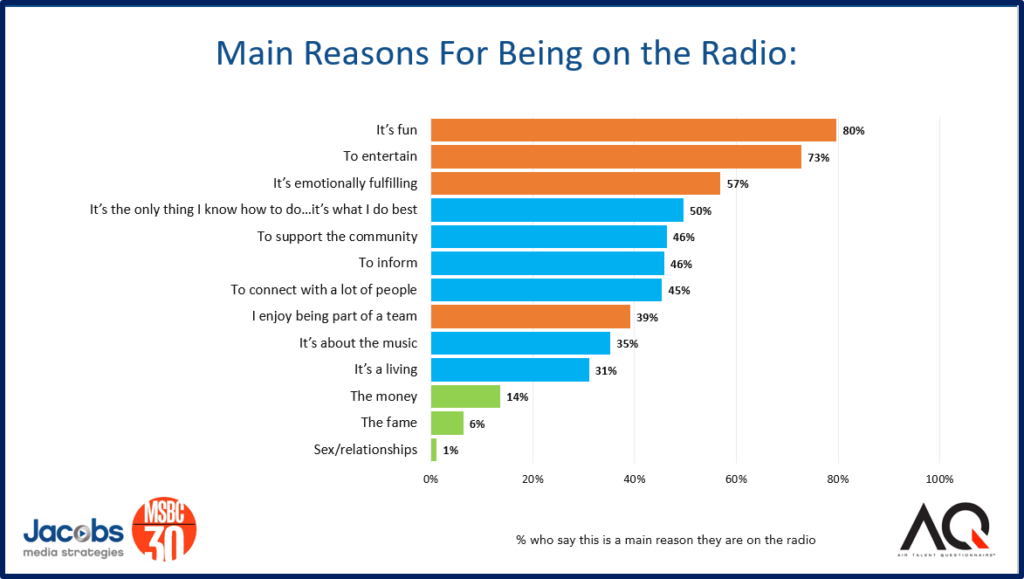
With all the research we conduct in radio – on the music, perceptions, and the other familiar measures – scant little survey work has been done with talent – about talent. In fact, our partner on the project – Talentmasters’ founder Don Anthony – believes this is the first research study of its kind that actually talks to people on the air to take their temperatures.
We conducted this survey in June with the goal of 400 in-tab interviews. We ended up with a much more robust turnout – more than 1,100 completed surveys here in the U.S. And based on its maiden presentation at Don’s Morning Show Boot Camp last week, a capacity audience enjoyed having the mirror held up – to see themselves for the first time as a community.
And in fact, that’s why MSBC was created. This year’s Chicago conference was its 30th anniversary. And a large group of us surprised Don at a local 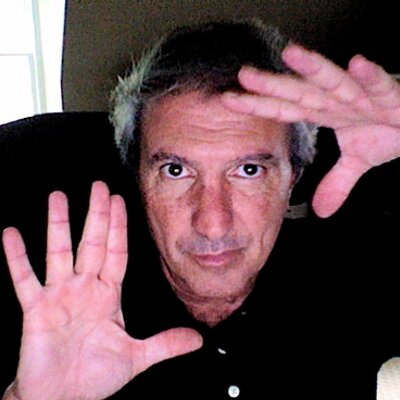 restaurant to celebrate the milestone. A number of people – Paul Castrovno, Mike McVay, B. J. Shea, and others – stood up to pay tribute to the guy who first brought a diverse group of talent together back in 1988. As Don explained, the first couple of conferences weren’t successful – in fact, he lost more than $20,000 that first year – not a small amount of money in ’80s dollars.
restaurant to celebrate the milestone. A number of people – Paul Castrovno, Mike McVay, B. J. Shea, and others – stood up to pay tribute to the guy who first brought a diverse group of talent together back in 1988. As Don explained, the first couple of conferences weren’t successful – in fact, he lost more than $20,000 that first year – not a small amount of money in ’80s dollars.
Fortunately for all of us, Don stayed with it. And in the process, he’s fostered and nurtured a community of excited, enthusiastic, and empathetic talent, eager to learn, grow their skill sets, and help one another. As I listened closely to so many thankful DJs and personalities express gratitude to Don’s support over the years, it struck me how prescient he was to build a business around its most valuable resource – its talent.
Another AQ question asked our large sample about their ultimate professional goal. On top of the heap, mentioned by nearly four in ten, is the sentiment those California lottery winners expressed after winning their financial jackpots: “Being happy and working with good people regardless of market size.”
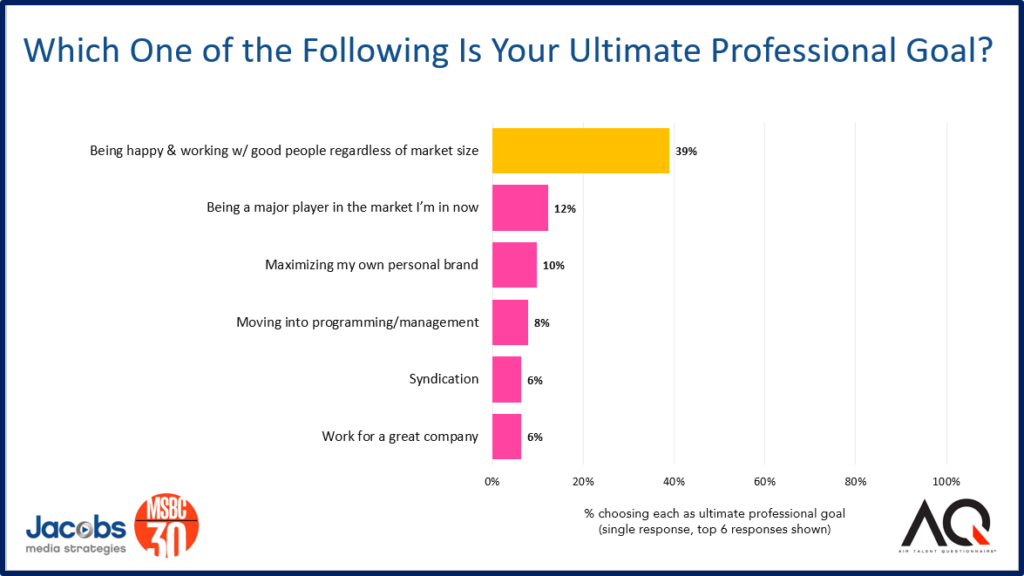 By the way, the goal a couple decades ago might have been to steadily work their way up to nabbing a major market job. In fact, the response to the statement – “Keep moving up in market size until I get to a Top 5 market” – was chosen by only 4% of respondents.
By the way, the goal a couple decades ago might have been to steadily work their way up to nabbing a major market job. In fact, the response to the statement – “Keep moving up in market size until I get to a Top 5 market” – was chosen by only 4% of respondents.
In AQ, we also learned that most air personalities – regardless of market size, daypart, and measurement methodology – feel a sense of angst and insecurity in the current broadcast radio climate. On top of that, four in ten tell us they’re never airchecked. And more often than not, many feel overlooked, ignored, or unappreciated by management.
In between sessions, a veteran morning personality walked up to me, thanked us for conducting AQ, and asked this question:
Why is that broadcast executives always point to personality as being radio’s secret sauce, but often treat air talent with ambivalence and as cogs in the machine?
I know the AQ data very well, but I had no adequate response to his question.
Air talent lack direction and attention not because programmers and ops managers don’t want to provide it. Many are simply time-deprived, overseeing multiple brands and even multiple markets, and unable to carve out the time necessary to work with talent. That’s not just a problem today, but one that will loom larger in coming years, as talent consider their options outside the broadcast platform.
One more finding I want to share with you speaks volumes about the current state of air talent discovery and growth. It turns out the nearly three-fourths of AQ respondents got their starts working nights, overnights, and weekends. Yet, when we asked these same personalities about their main role at their stations, only 14% are employed in those same “starter dayparts.”
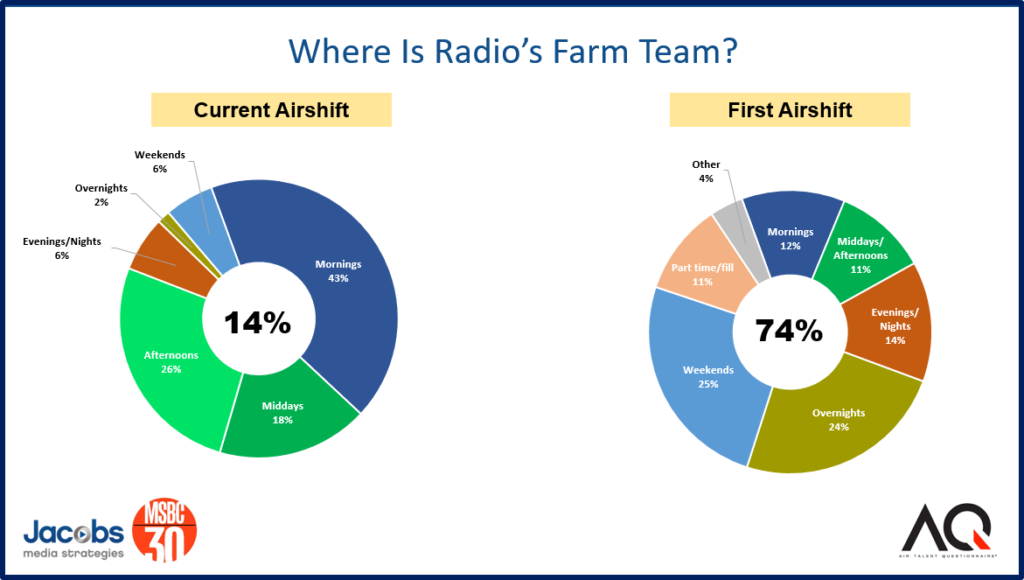
In today’s world of radio, dominated by Wall Street headlines and quarterly results, financial pressures have all but decimated the farm team, leaving broadcasters frequently scrambling to replace or improve their talent rosters. It is truly wonderful that so many CEOs are steering their companies toward innovative platforms such as podcasting, mobile, and voice. But let’s not forget the men and women behind the mic who create the connectivity between the medium and the audience.
AQ reinforces many of the basic tenets that have guided radio’s growth, sustainability, and uniqueness. It also outlines the steps that broadcast managers and owners should consider as they team build, reinforce, and strengthen their on-air lineups.
Radio’s most valuable resource is its personality – the key to entertainment, as well as connection with communities and audiences.
Don Anthony figured that out back in the days before the Internet, apps, and Alexa.
All these new technologies are important, of course.
But so is acknowledging and nurturing what makes radio great.
Originally published by Jacobs Media

